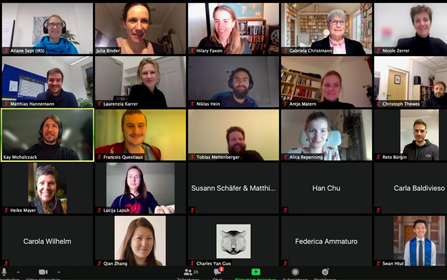Main Content
COVID and what next?
Methodological Implications for Digitalization Research in Rural-Peripheral Areas

For almost two years now, researchers are confronted with new challenges in adapting their research to the transforming socio-spatial conditions. Previously planned research designs lose their validity, field approaches have to be redefined, social actors in public space sometimes remain invisible. This is often particularly true for research in peripheral spaces, as not only are planned field research suddenly replaced by other field access strategies on the home computer, but also the digital equipment of these spaces is often less adequate.
In this context an online workshop co-organized by the IRS was held on November 17th, 2021: “COVID and what next? Methodological implications for digitisation research in rural-peripheral areas” with participation of the IRS took place. Based on the idea of discussing the methodological challenges of the pandemic for digitalisation research in rural-peripheral areas, the workshop illustrated the current problems and new methodological developments.
Christina Noble (The James Hutton Institute Aberdeen, UK) reported in her keynote on the challenges of a participatory research project with crofters in the north-west of Scotland. The remote community was difficult to reach digitally, and the study area had only received broadband access shortly before the pandemic. At the same time, digital tools such as sales platforms, telemedicine or online courses were able to mitigate the local consequences of the lockdown. The digital skills thus acquired in turn led, among other things, to the participation of further groups in the research that could not be reached with face-to-face meetings. Online-only participation, on the other hand, would exclude those without digital access or skills, as well as the growing group of those experiencing increasingly “digital fatigue”. Christina Noble concluded that digitalisation is a double-edged sword and that networking opportunities of all kinds must be encouraged. She is convinced that hybrid options are likely to remain in the future.
In three parallel working groups, the participants then discussed “Digitalisation Research in Rural Areas” (Chair: Heike Mayer), “Integrated Methods” (Chair: Julia Binder) and “Dynamics of Knowledge Traditions” (Chair: Gabriela Christmann), each with two to three inputs. The topics ranged from digital pioneers in rural areas of Germany to digital multilocality in the Swiss mountains or socio-ecological research on artisanal fishing in Bolivia to photovoice approaches in Burkina Faso. Despite the numerous challenges during the pandemic, creative solutions emerged. The researchers had rural dwellers create photo diaries, observed the preparation of meals via zoom, used digital tracing or collected additional quantitative data. It was often reported that the amount of data in particular has increased and that other competences and new collaborations have become more important. For example, programming skills are increasingly in demand also in the social sciences.
Similar questions were also addressed by Hilary Faxon (University of California, Berkeley, USA), who in her closing keynote set out on the path from villages in Myanmar to a global research agenda that places peripheries at the centre. Her starting point is the recognition that the digital and material are increasingly interlinked in networked geographies of agrarian change. By going from “from ground to cloud”, she pleaded for a wide variety of methods and reported, among other things, on her experiences with “scraping data” using the example of land sales groups on a social media platform. Via new APIs and online archives, large amounts of data on different topics can be generated with comparatively little effort and only a few specialised skills, and can be triangulated with other data, e.g. from ethnographies or interviews. In the future, an ethics of care for online archiving and data security has to be developed.
Overall, the workshop showed that digitalisation research in rural areas during the pandemic entails ethical, moral and legal obligations with which we will continue to deal in the future. Among them is the question of the role model function of research when it comes to travel, for example. Hybrid forms of participatory research in particular are developing dynamically and bring logistical challenges, but offer new opportunities for participation for the population in rural areas. The use of digital methods alongside qualitative, face-to-face methods opens up many possibilities for obtaining different types of data and will continue to gain ground.
The organisers Prof. Dr. Heike Mayer (University of Bern), Dr. Julia Binder (BTU Cottbus), Prof. Dr. Gabriela Christmann and Dr. Ariane Sept (IRS, Erkner) would like to thank all participants and hope to continue the exchange.


